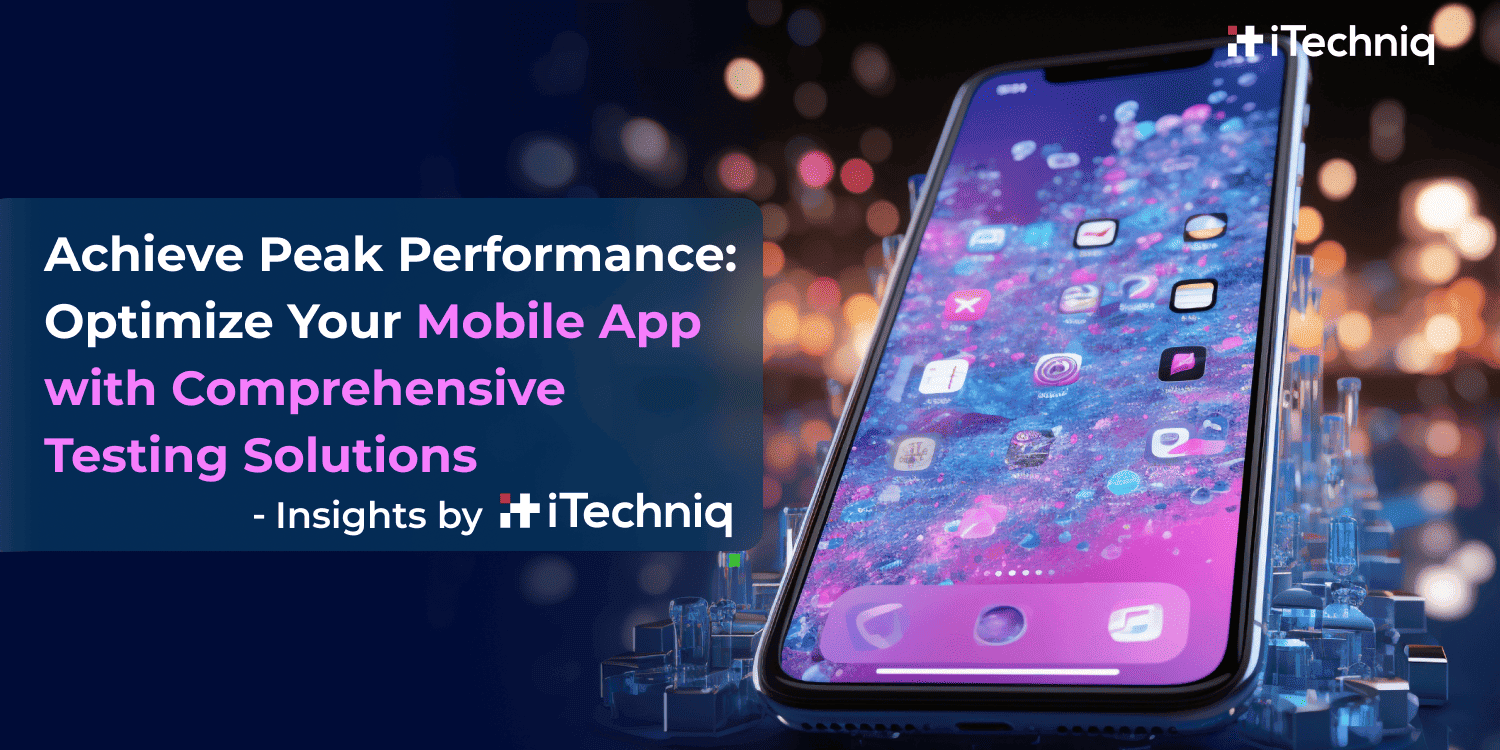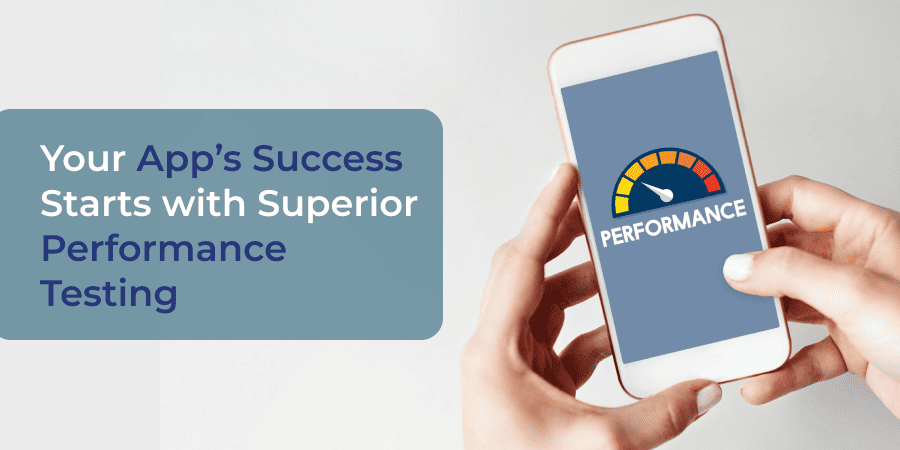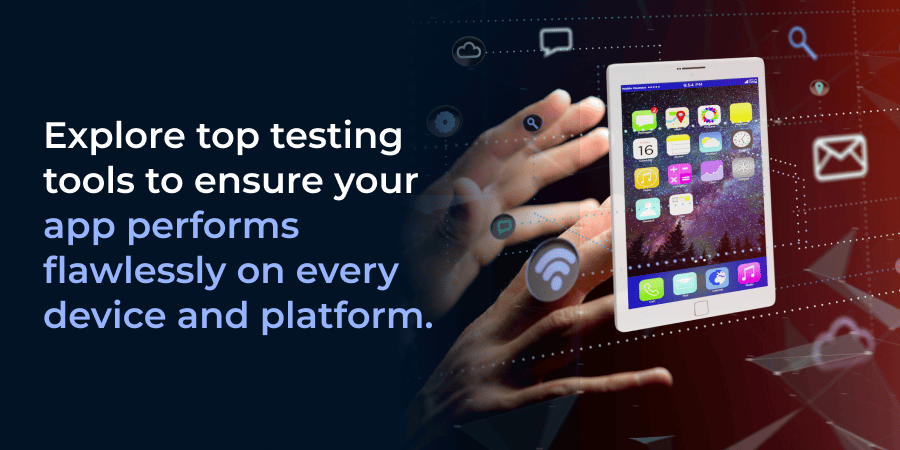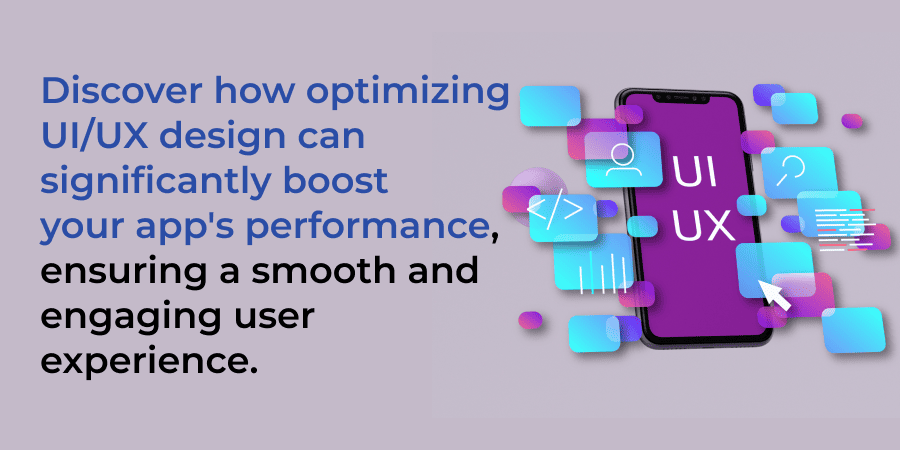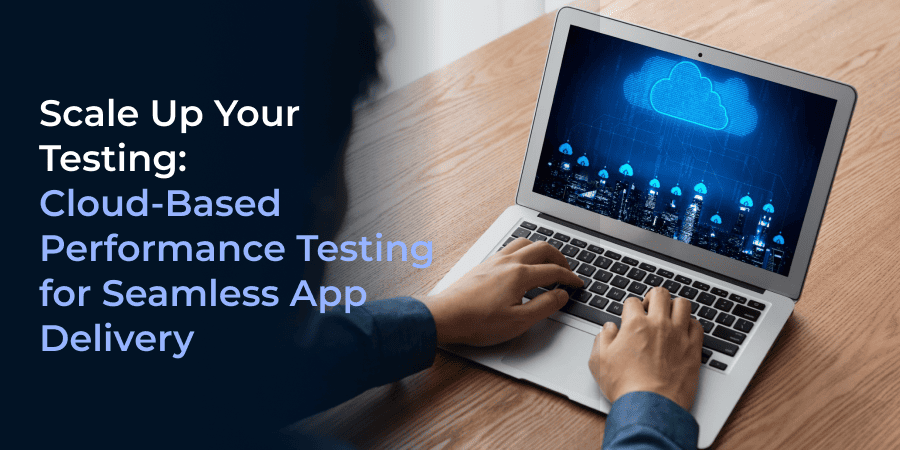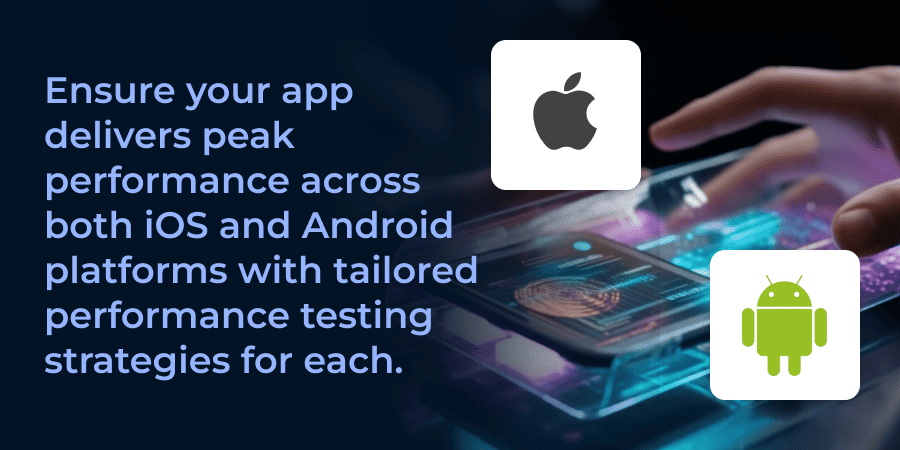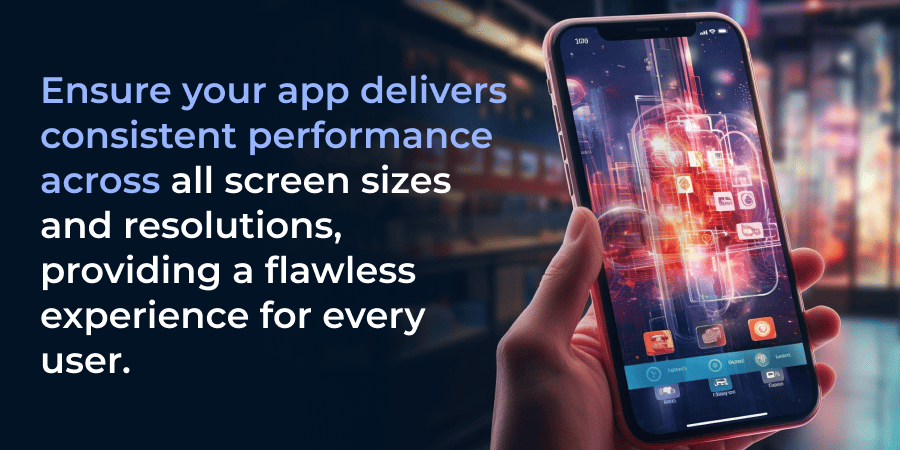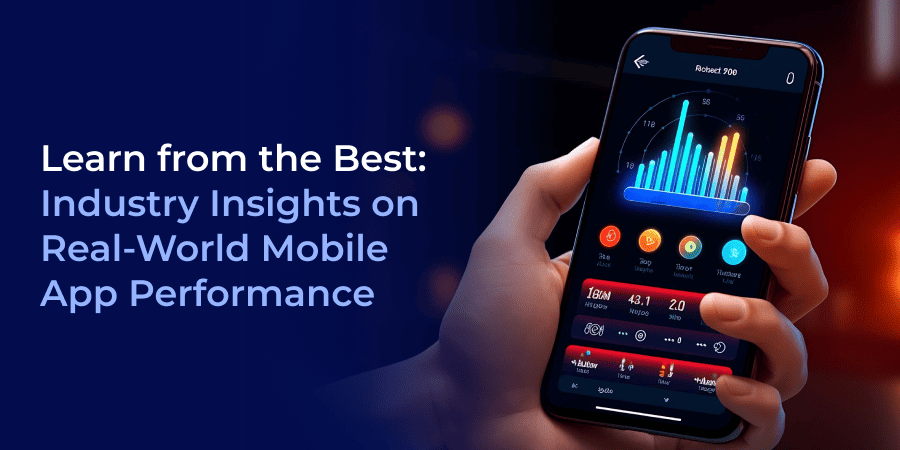Mobile application performance testing is no longer an option in today’s digital world; it’s essential. The very success of an app relies on whether it can offer a flawless user experience, ensure smooth operations under load, and offer optimal performance on different devices and networks. Investing in mobile application performance testing services can open up roads to excellence for businesses vying to take the top spot in their respective fields.
Whether you’re building for iOS, Android, or both, this guide will help you navigate the complexities of performance testing. We’ll explore strategies, tools, and techniques to ensure your app meets user expectations while showcasing why partnering with the best mobile app development company makes all the difference.
What is Mobile App Performance Testing?
Mobile app performance testing is the exercise of testing the speed, responsiveness, stability, and scalability of an app under different conditions. It finds bottlenecks, assures cross-device compatibility, and generalizes the user experience.
Types of Tests in Performance Testing
- Load Testing: Simulates real-world usage to determine how an app performs with various loads.
- Stress Testing: Determines the breaking point of an app by overloading its systems.
- Scalability Testing: Ensures the application is able to support a large number of user requests.
- Battery and Network Usage Testing: Tests the consumption of power and performance at various network conditions.
Why Mobile App Performance Testing?
- Improve app responsiveness and speed.
- Detect and resolve performance issues early.
- Enhance scalability to accommodate user growth.
- Deliver a polished user experience that reflects quality and reliability.
User expectations are higher than ever. Any lag or crash can drive users to competitors. With robust mobile app performance testing services, you can:
By collaborating with the best mobile app development company in UK, you can ensure your app meets these benchmarks efficiently.
Performance Under Pressure: Testing Every Critical App Area
Mobile Application Testing Performance Areas
- Security and Data Integrity: Protecting the user data and performance are two sides of a coin. Integrate the security checks in your cycle of performance testing.
- Speed Testing: The users want instant responses. Speed testing assures that your app satisfies those needs; you reduce latency and load time for your users.
- Load and Stress Testing: By simulating multiple users, you can identify breaking points and optimize backend systems to handle peak traffic.
- Compatibility Testing: Your app should run perfectly on different devices, operating systems, and screen sizes. Compatibility testing is thorough and covers all aspects.
- UI/UX Testing: UI/UX Design Services by the provider ensure that your app is intuitive, responsive, and pleasing to the eye.
- Security and Data Integrity: Protecting the user data and performance are two sides of a coin. Integrate the security checks in your cycle of performance testing.
Studies reveal that 53% of mobile users abandon an app if it takes longer than 3 seconds to load.
Mobile App Performance Testing Automation
Automation has revolutionized mobile app performance testing services. Automated tests can be conducted within a short time frame, with zero human errors and consistent results. Here are reasons why automation is the game-changer:
Advantages of Automation
- Speed and Efficiency: The automated test runs faster than the manual test.
- Consistency: It guarantees standardization of testing.
- Cost-Effective: Long-term costs are reduced because the process is streamlined.
- Comprehensive Testing: It handles complex test cases.
Automated testing detects up to 85% of performance-related bugs before deployment.
Role of Automation in Testing Mobile Apps
Automation makes the complexities easy by allowing repetitive tasks, reducing human error, and speeding up the testing process.
1. Key Automation Tools
- Selenium: Although Selenium is mainly used for web applications, it supports mobile app testing when used with tools like Appium.
- Kobiton: Allows real-device testing and integrates with popular CI/CD tools.
- Appium: An open-source tool for automating native, hybrid, and mobile web applications.
- Perfecto Mobile: This is a cloud-based system that offers the most advanced test features for mobile applications.
2. Advantages of Automation
- Scalability and Speed: Automating tests enables testers to run many tests in an extremely short period.
- Greater Accuracy: Automating tests reduces interference from humans, thus the accuracy.
- Cost-Effective: Although it is expensive during the setup process, automation eventually saves costs that would otherwise be incurred in manual testing. Adding automation to performance testing services for mobile applications really changes the game, making seamless integration into development workflows.
Mobile Application Performance Testing Tools Top Tools
- Apache JMeter: It is an open-source, free tool which deals with load and performance testing. It is mainly used for Android and iOS.
- Appium: It is one of the most popularly used mobile application automation testing tools that are used over multiple platforms.
- LoadRunner: Use this for scalability and load tests and check whether your app would be able to endure high usage.
- TestComplete: A user-friendly tool that streamlines the process of creating automated tests for apps with UI/UX Design Services in mind.
- Calabash: An open-source framework for testing apps on iOS and Android devices.
The best mobile app development company in UK will ensure you get access to the latest tools and strategies for robust testing.
Role of Load Testing in Performance Optimization
1. What is Load Testing?
Load testing is the measure of an app’s capability to handle a specific number of users or transactions at the same time.
2. Critical Metrics Measured
- Response Time: The time it takes for the app to respond to user requests under load.
- Throughput: The number of transactions that the app can process within a given time.
- Resource Utilization: Monitoring CPU, memory, and network usage during peak loads.
Unlock the full potential of your app by following best practices in performance testing for superior speed, reliability, and user experience.
Best Practices for Mobile App Performance Testing
- Testing Early: Introduce performance testing in the initial stages of development so that problems are found and rectified early on.
- Realistic Testing: Use data that brings to life real world conditions such as different devices, networks, and user behaviors.
- Critical Metrics: Track load time, battery usage, memory consumption, and crash reports during the testing process.
Integrating Security and Performance Testing
Security is an integral part of the performance. No matter how fast or efficient an app is, vulnerabilities can undo all the good work. Leading UI/UX Design Services providers integrate security checks during performance testing to deliver apps that are not just high-performing but also secure.
- Load Testing for Security: Stress your app with high loads to determine how it performs under cyberattacks or sudden usage spikes.
- Encryption Tests: Ensure data transfer remains encrypted and secure even at maximum stress.
- Third-Party Integration Checks: Most apps integrate APIs and third-party plugins. Testing these integrations is important to ensure performance and security are maintained.
Navigate the complexities of performance testing to ensure your app delivers consistent, top-tier performance across all devices and environments.
Challenges in Mobile App Performance Testing
- Device Fragmentation: The biggest challenge of performance testing is the sheer variety of devices, screen resolutions, and OS versions. For example, the same app may work fine on an iPhone but fail on some older Android devices.
- Network Variability: Mobile applications work in different environments-from Wi-Fi to 4G to 5G. Therefore, one should be careful while ensuring reliability with regard to the performance under the changing network conditions.
- Resource Constraints: Applications will vie for CPU, memory, and battery resources. The importance of testing under constrained conditions lies here.
- User Behavior: There could be some difficulties in performing performance testing due to realistic simulation of real user behavior like multitasking, background app usage, and heavy data input.
Cross-Platform Performance Testing: Challenges and Solutions
Cross-platform apps are a preferred choice for businesses that look to reach a broader audience with one codebase. However, the performance testing of cross-platform apps presents some unique challenges.
1. Challenges in Cross-Platform Performance Testing
- Framework-Specific Limitations
- Frameworks such as React Native or Flutter have performance bottlenecks on certain devices.
- Hardware and OS Diversity
- Testing must be carried out across a wide variety of hardware configurations and OS versions.
- Third-Party Dependencies
- Cross-platform applications often use third-party libraries, which can create latency.
2. Solutions
- Utilize real-device testing platforms such as BrowserStack or Sauce Labs to perform detailed compatibility tests.
- Optimize code to compensate for framework-specific performance quirks using expert mobile app performance testing services.
- Test APIs and networks in depth to ensure smooth integration of third-party dependencies.
Though Chrome and Firefox are most popular, many users still use browsers like Yahoo. So, the best practice would be to ensure your app works across all major browsers through cross-browser testing.
Network Testing: Verify Connectivity in the Real World
Apps often need to assume uninterrupted network connectivity to get their job done. Performance testing of your app across networks ensures it behaves well despite network quality.
1. Scenarios for Testing
- Low Bandwidth Network
- Simulate poor network connectivity to make the app operate at its best.
- Network Switching
- Test how it handles transitions from Wi-Fi to 4G to 5G.
- Latency and Packet Loss
- Analyze the app’s response to delayed or lost data packets.
2. Tools for Network Testing
- Charles Proxy: It simulates various network conditions for performance testing.
- Network Link Conditioner: This is built into macOS for testing under simulated network constraints.
Role of UI/UX in App Performance
The user interface and experience directly affect the performance of an app. Here’s why integrating UI/UX Design Services is important:
- Simplifies navigation and reduces user frustration
- Optimizes loading time due to efficient design
- It makes the app more usable and intuitive.
By integrating UI/UX Design Services with performance testing, you end up with an application that is not only useful but also a pleasure to use.
94% of first impressions are design-related, making UI/UX Design Services essential for app success.
UI/UX and Performance Testing Synergy
The success of an app is directly proportional to its user interface and experience. Performance testing should be in tandem with UI/UX Design Services to identify the bottlenecks in interactions with the user.
Performance Aspects of UI/UX
- Screen Load Times: Slow-loading screens affect user retention.
- Animations and Transitions: Test how animations would perform under load.
- Responsive Design: The app should change perfectly according to different screen sizes.
Partnering with a provider offering UI/UX Design Services ensures your app doesn’t just work but wows users.
End User Monitoring in Performance Testing
Monitor real-time application usage to pinpoint performance bottlenecks affecting users directly.
1. Key Practices
- Synthetic Monitoring: Simulate a user experience for measuring application performance.
- Real-User Monitoring (RUM): Understand problems faced by real users through their actual data.
- Session Recording: Identify challenges through a user’s sessions while working.
2. Advantages of End-User Monitoring
- This practice yields actionable insights into what users are doing.
- Can help identify fixes for what is needed most to deliver value for customers.
- End-user monitoring in conjunction with UI/UX design services therefore allows for optimum user experience with robust app performance.
Cloud-Based Performance Testing
Cloud-based tools transform the landscape of performance testing with scalable and cost-effective solutions.
1. Benefits of Cloud-Based Testing
- Global Testing: Test the use of the application from various geospatial locations.
- Scalability: Easily scale your tests to mimic thousands of concurrent users.
- Cost-Effectiveness: Pay-as-you-go pricing gets rid of costly on-premises infrastructure.
2. Best Cloud-Based Tools
- BlazeMeter: Rich features in load and performance testing
- Perfecto: Offers easy access to a wide variety of real devices for perfect testing.
- AWS Device Farm: Test apps on multiple devices hosted in the cloud.
Performance Testing for iOS vs. Android Apps
Though the principles of performance testing are similar, the differences in the iOS and Android ecosystems require a more customized approach.
1. Performance Testing for iOS
- Test for memory leaks since iOS devices have less RAM than Android.
- Optimize for the latest iOS versions, with backward compatibility whenever possible.
2. Performance Testing for Android
- Android apps should be compatible with different hardware configurations, so compatibility testing should be given more importance.
- Address fragmentation issues to ensure performance optimized across low- and high-end devices.
Using expert mobile application performance testing services, businesses can resolve these issues and develop magnificent apps for both platforms.
Importance of Mobile App Performance Testing for Startups
Startups face resource constraints; however, the delivery of a high-performance app makes them stand out in competitive markets. This is why mobile app performance testing services is important for startups:
1. Why It Matters
- First Impressions Count: Slow or buggy apps can deter potential users and impact user acquisition.
- Scaling Challenges: Apps must scale with an increasing number of users without losing performance.
2. Testing Strategies Suitable for Startups
- Open-source tools such as Apache JMeter for cost-effective performance testing
- Mobile app performance testing services provider to help them with tailored solutions
- UI/UX Design Services should be the priority to align performance with user expectations
Integrating AI in Mobile App Performance Testing
Artificial Intelligence is revolutionizing mobile app performance testing, which is becoming more efficient and insightful.
1 Applications of AI in Testing
- Predictive Analysis: AI algorithms predict potential performance bottlenecks before they happen.
- Test Case Generation: Automatically generate test cases based on user behavior patterns.
- Real-Time Monitoring: AI-driven tools analyze live app performance, identifying issues instantly.
2. Benefits of AI Integration
- Faster test cycles and improved accuracy.
- Enhanced test coverage through intelligent automation.
Using AI, businesses can streamline performance testing and stay ahead as the best mobile app development company in a competitive landscape.
Cross-Screen Performance Testing
Apps must work seamlessly across different screen sizes and resolutions.
1. Considerations
- Responsive Design: Make sure elements are responsive and scale well on a different screen size using UI/UX Design Services.
- Pixel Density: Test how high DPI screens render images and text.
- Interaction Testing: Test touch gestures and interactions are still smooth across devices.
2. Tools Used
- BrowserStack: Test for performance across multiple screen sizes and devices.
- Perfecto Mobile: Test on real devices to get actual results.
API Testing and App Performance
APIs are what make an app work, and therefore API performance testing is an important component.
1. Important Metrics to Test in API Testing
- Response Time: Measure the response time of APIs in order to return requested data.
- Error Rate: Record the failed API calls.
- Data Throughput: Measure the volume of data that APIs can process.
2. API Testing Tools
- Postman: Test API responses as well as simulate various data scenarios.
- SoapUI: Best suited for complex requirements of API testing.
Ensuring that APIs are robust leads to delivering reliable and high-performance apps, which makes a best mobile app development company.
Understanding the Cost of Neglecting Performance Testing
Skipping or under-prioritizing performance testing can lead to severe repercussions.
- Revenue Loss: Apps that crash or lag lose users, hence revenue.
- Brand Damage: Poor performance can damage a brand’s reputation.
- Increased Maintenance Costs: It is more expensive to fix performance issues after the app is launched than during development.
Understanding these costs will help a business put the focus on testing and align with the best mobile app development company for long-term success.
Industry Insights: Real-World Applications
- Retail Apps: In sales events, the call of the hour is performance. Load testing ensures that applications will not crash when traffic shoots up.
- Banking and Finance: High-security applications require strong performance testing to ensure data integrity and smooth transactions.
- Gaming Apps: Users want high-speed, immersive experiences. Stress testing ensures consistent performance under load.
Emerging Trends in Mobile App Performance Testing
- AI-Powered Testing: Complex testing scenarios, prediction of user behavior, and possible bottlenecks are detected much more effectively using artificial intelligence.
- Cloud-Based Testing: Cloud testing platform provides scalable, cost-effective performance testing solutions for multiple devices and operating systems.
- Continuous Testing in DevOps: Continuous performance testing through DevOps integration in the pipelines ensures smooth testing throughout the development lifecycle.
- Real-Time Analytics: Real-time monitoring of apps during testing will provide actionable insights for immediate optimization.
Case Studies: How Performance Testing Saved the Day
- Case Study 1: E-Commerce App Optimization
Problem: An e-commerce app crashed frequently during sales events.
Solution: A full load test was done with Apache JMeter.
Results: Optimized server configurations reduced crash rates by 95%.
- Case Study 2: Banking App Under Load
Problem: A banking app had slow response times during monthly billing cycles.
Solution: LoadRunner identified database bottlenecks, which were optimized.
Results: Reduced transaction time by 60%, leading to higher customer satisfaction
These success stories are representative of the value mobile application performance testing services bring forth in high-performing application delivery.
Choose iTechniq for comprehensive mobile app performance testing to ensure seamless, high-performing apps that delight users and drive success.
Why Choose iTechniq for Mobile App Performance Testing?
As the best mobile app development company, iTechniq specializes in delivering top-tier mobile app performance testing services. Here’s what sets us apart:
- Expertise in performance optimization for iOS and Android.
- Integration of advanced tools for automation.
- Seamless collaboration to deliver applications with the best UI/UX Design Services.
Trust iTechniq’s expert testing to ensure your app delivers exceptional performance, every time, on every device. Enhance user satisfaction and maximize success with precise, reliable performance testing.
Assuring stellar performance through expert testing
In the competitive world of mobile applications, performance is the foundation of user satisfaction, retention, and business success. With the best mobile app development company, businesses can utilize advanced mobile app performance testing services, cutting-edge UI/UX Design Services, and innovative solutions tailored for both iOS and Android platforms.
iTechniq-a trusted partner in this journey-as a leading mobile app performance testing services provider, whose unmatched capabilities are here, whether you need end-to-end testing for your Flutter apps, React Native apps or native apps, we are to help you shine.
Connect Us Today!
Ready to optimize your app with peak performance? Partner today with iTechniq. Elevate your mobile experience!
Stay Ahead of the Curve: Explore Emerging Trends
Post Views: 344
